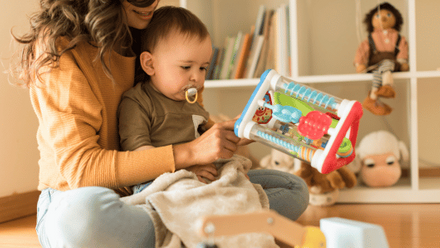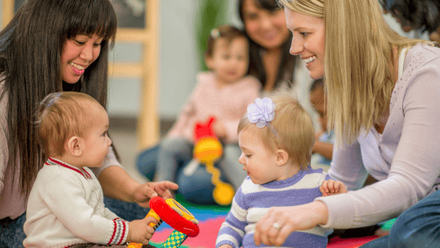How to support care-experienced children in early education and care
All children deserve a loving, stimulating environment in which to grow and reach their potential in a safe and caring environment. But, for some children, this is not their reality.
In 2023, over 84,000 children were being looked after by local authorities, including adoptions. In Wales alone, there were 116 per 10,000 looked after children in 2023.
Whilst this gives some indication of how many children are involved with care-experience, these statistics do not enlighten us to children who have previously been looked after.
Evidence shows that care-experienced children face additional barriers to accessing quality education and care provision throughout their schooling experiences, including in their early years.
This learning workout will explore some of the ways we can create a more inclusive environment for children who are care-experienced and how we can best support them from a young age.
What does care-experience mean?
A care-experienced individual is someone who has, at any time, been looked after by the local authority, for any period of time. This is a relatively new term to social work and aims to encapsulate a variety of experiences throughout social care. As we know, all families are unique and their circumstances cannot be simplified.
Care-experienced circumstances include, but are not limited to:
- a looked after child, in residential care or fostered
- a previously looked after child
- adopted children who were previously looked after
- special guardianship/ kinship care.
Children become involved in the care-experience system for a variety of reasons. Some of the more common reasons include:
- abuse or neglect
- family dysfunction
- child illness
- adult illness
- absent parenting
- socially unacceptable behaviour.
It is a term that aims to be as inclusive as possible, but it’s important to acknowledge that all circumstances are unique and some individuals may prefer to be referred to in other ways.
Why is it important?
Some of the more common barriers faced by care-experienced children in accessing quality education include:
- a lack of positive role models in their lives
- a lack of consistency in their routine
- experiencing Adverse Childhood Experiences (ACEs), which can lead to a number of associated risks.
For these reasons and more, care-experienced children tend to have poorer educational outcomes. We know that a high quality early education and care provision is vital for improving all children’s outcomes, but this is especially true for children who face additional barriers to a full and healthy development, including those who are care-experienced.
It is important that, as professionals, we understand the unique circumstances that care-experienced children face and how we can support them within setting.
Let’s have a look at some of the ways you can help to knock down those barriers for care-experienced children in their early education and care…
Using inclusive language
A big part of learning environments involves talking about celebrations and significant days throughout the year. Some of these are event-based and widely acknowledged, such as celebrating the Olympic Games, whilst others are more culturally engrained, such as Christmas and Eid. A lot of these celebrations revolve around time with family – which, for a lot of care-experienced children, can look slightly different and could provoke sensitivity.
- Days such as Mothering Sunday and Fathers’ Day can be made more inclusive by reframing them within activities to celebrate ‘someone special.’ Children can be involved in activities to emphasise an appreciation for someone they care for, rather than being specific about a figure they might not have at the moment.
- One simple way to include all family dynamics is to refer to adults at home as ‘grown ups’ or ‘adults at home’ rather than specifically labelling roles such as ‘mums and dads’. This small change is easy to implement and creates an inclusive environment that does not assume family structures.
Providing positive role models
Having positive role models has a significant influence on our motivation, self-belief and enthusiasm, which is why it is such an influential factor when considering access to education.
Professionals working with children in early education and care have a responsibility and privilege to provide a positive, compassionate and encouraging figure for all children, but this makes an even bigger impact on children who might not have as many influential people in their lives.
- Draw attention and praise good behaviours, using positive reinforcement to instil a sense of confidence. Ensure they understand what they have done well and make sure these are actions that you mirror back to them. This helps children understand that you value their behaviour and show them that you are paying attention and listening to them in many ways.
Being consistent
It is common for care-experienced children to have come up against a higher-than-average sense of uncertainty and inconsistency in their lives, particularly surrounding home environments. We know that a safe and stimulating home learning environment is essential to healthy wellbeing and development so it is important that early education and care providers set to be as consistent, safe and predictable as possible for children who might need additional reassurances.
- Visual timetables are a great way of highlighting the day’s events and helping children adapt to last minute changes which might upset their routine. Make sure to communicate reasons why well and involve them in the process as much as possible to give children a sense of control.
Key takeaway
Overall, the number of children experiencing care is increasing year on year and it is important that early education and care professionals are aware of the additional barriers faced by care-experienced children in order to provide the best support for their specific needs.
Remember, every child is unique and their backgrounds play an important part in who they are. There is not a ‘one size fits all’ approach to care-experience and it is important that we treat all families with the respect and compassion they deserve.






